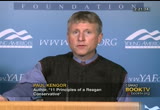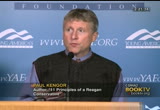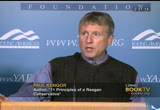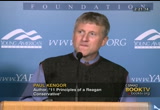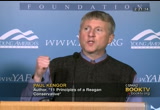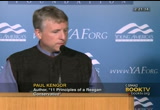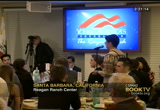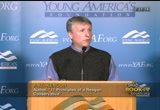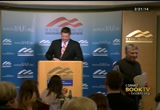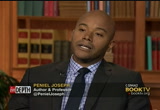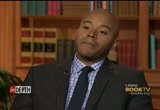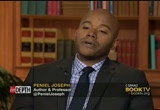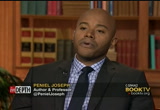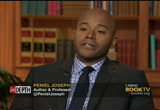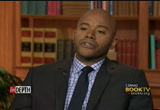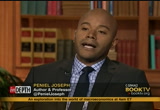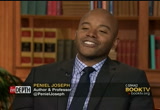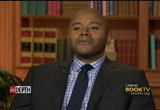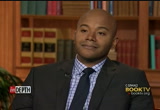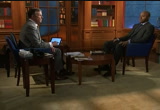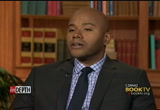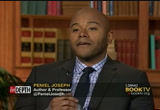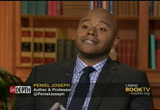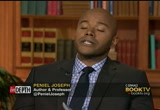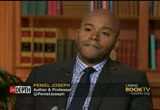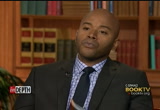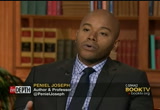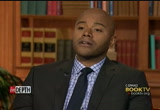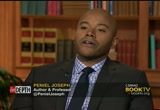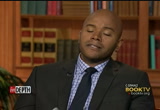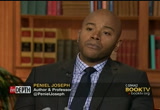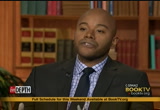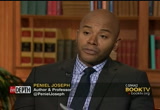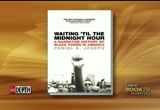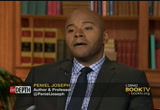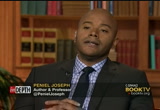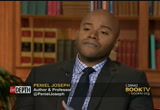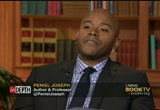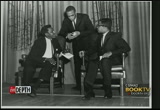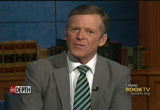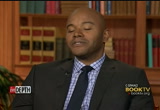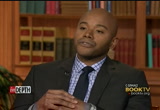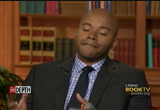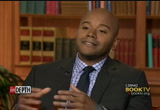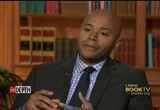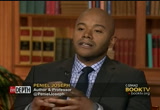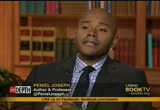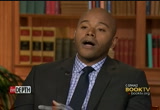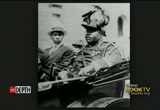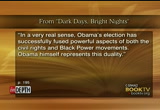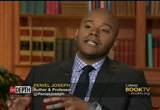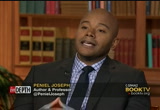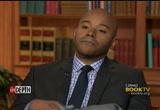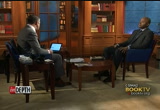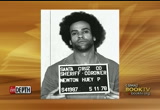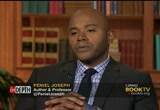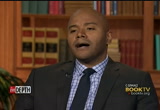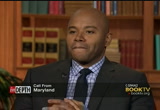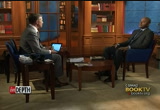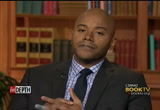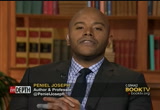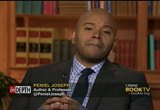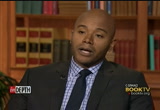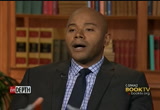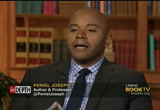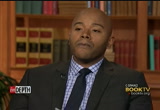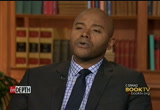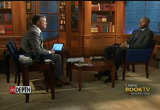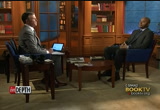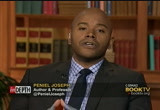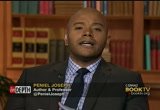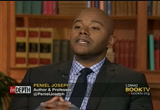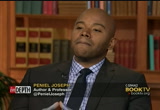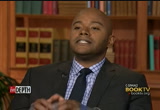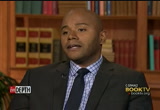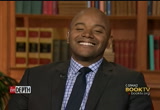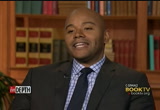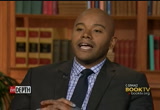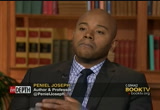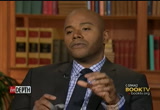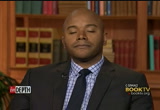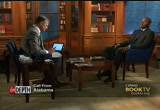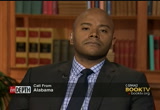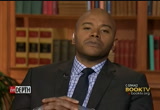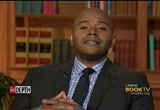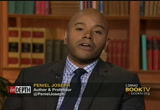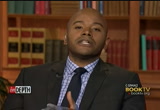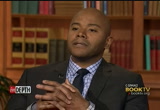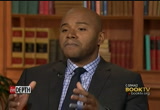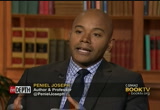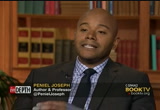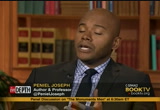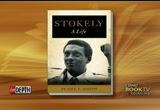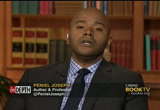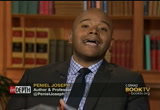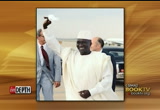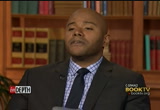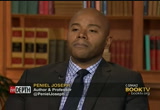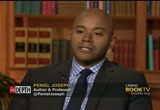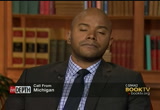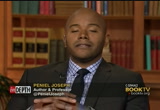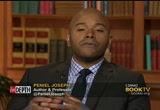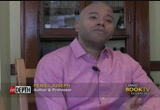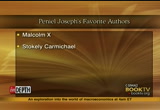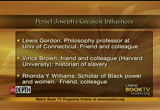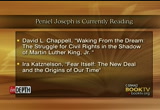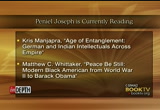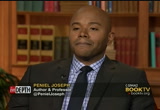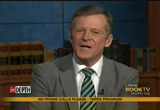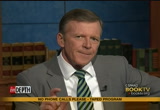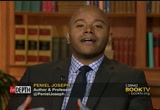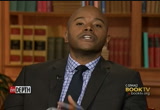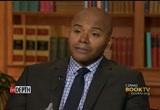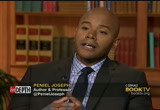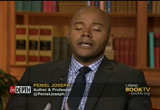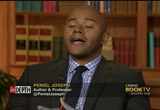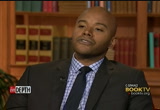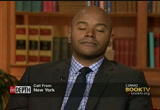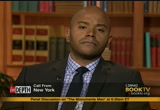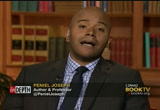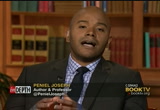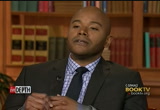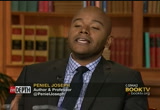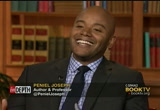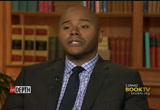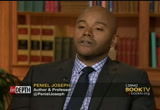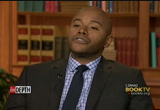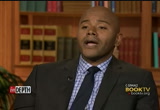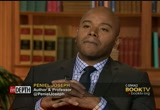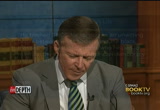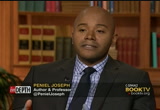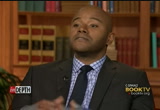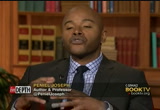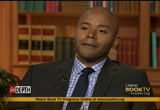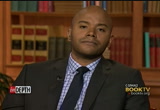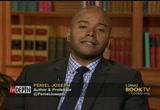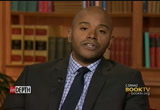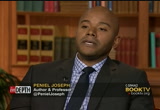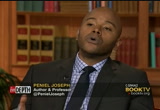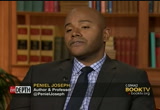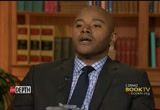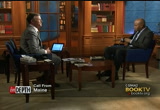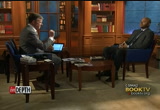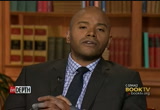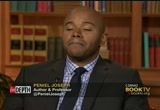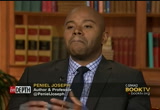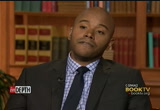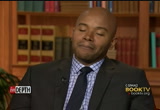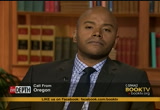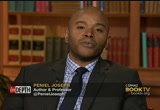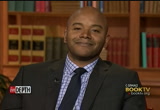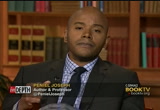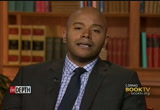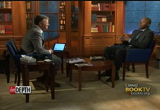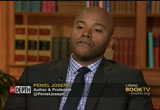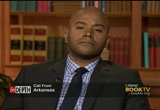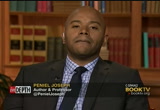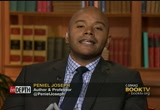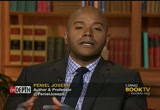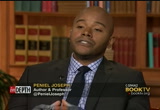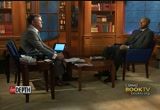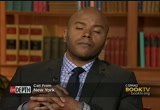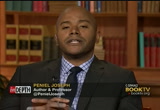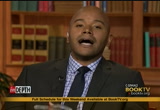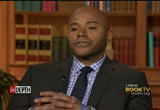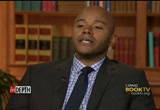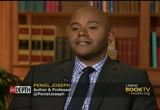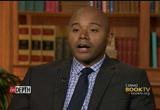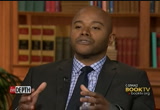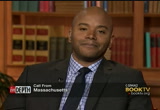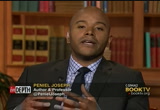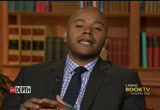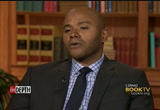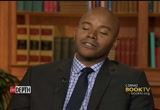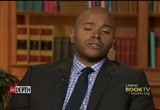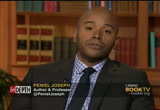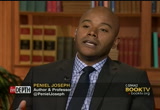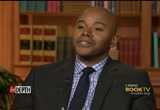tv In Depth CSPAN March 3, 2014 12:00am-3:01am EST
12:00 am
and reagan used military force only twice in grenada in october, 1983, which was fast and short and successful, got the american medical students out that he feared could become hostages and feared that grenada could become another soviet satellite or outpost of the caribbean. and in april, 1986 strike against libya. that was it. those are the only two times he used it. ..
12:01 am
12:02 am
gulag his captors said look. here is your reagan. cowboy comedy and a fall. and as soon as they left he could not contain his glee. he was jumping up and down and tapping in morse code ronald reagan called this the evil empire the next guy says start stepping we were called the evil empire than the gulag is coming now with the words evil empire. so the president had finally spoken the truth. >> with a follow up what it you think the ronald reagan
12:03 am
approach to syria and iran? >> great question. i am always larry to apply reagan also with the iraq war. what he had invaded? iran as a really good example june 2009 and the iranian streets first erupted and abominate merely week carter like statements even the democrats were astounded. he could have made stronger statements but reagan probably would have treated i really like solidarity in poland. a the people who want freedom, who one liberty, we stand at your side and support you. you have got the support of the united states. obama was not saying things like that at first initially.
12:04 am
you don't have to aid the i rigi and freedom fighters -- i read the and just like they did not give missiles for tanks but lane reagan was doing solidarity day solidarity week solidarity month making statements we are with you people of poland that was extremely powerful and invigorating and obama should do that because we thought we were "the shining" city on the hill. so reagan conveyed that message as he played it as a captive people behind the iron curtain to proclaim to the captives. >> regarding immigration
12:05 am
reform one of the most pressing issues i want to ask i was reading your research that our a mountain of illegal immigrants has such high levels that we can mask deep for all the gold mexicans to have the nef open jobs for all of california but liberal democrats attack me to say that is too radical in discriminatory. based on reagin conservatism in domestic policy with that issue right now in california is this too radical? it seems it would work every year in the constant growing deficit.
12:06 am
it to exacerbate the problem for even illegals to get scholarships driver's licenses it asco is true reagan conservative? >> he dealt with as the california governor but i go over this in the book. he granted amnesty to reach huge number of illegal immigrants in the 1980's. 1986. he used the argument it provides a valuable source of labor that not many but will take with a classic argument that you here today he granted amnesty but at the same time and exchange for what he plusses promised of tighter border security that would allow people to enter the country legally for kozo what reagan did was right to put the follow-up
12:07 am
never took place. that border security was not provided. the piece by peter robinson wrote for "the wall street journal" like what would reagan to? it is strongly recommended. any of their questions? do i get the hook. [laughter] it must be the parade that i gave him. [laughter] >> i have been waiting for this opportunity. [laughter] [applause]
12:08 am
12:09 am
june 15, 1966 in greenwood, mississippi. and he becomes this icon of the late 1960s. carmichael is going to be the most influential since malcolm acts. is friends with martin luther king jr. and he also is a black panther. by 1969 he leaves the united states in west africa. and he has this organizer who changes his name to kwame ture in honor of his political mentors in africa. kwame ture has taken them and he becomes kwame ture. >> host: what part of the civil rights movement was he involved
12:10 am
in? >> guest: is involved in all of it. and that is what is so interesting. when you think about stokely carmichael, he's involved in every major action between 1960 and 1965 with the whole period of civil rights cut in half. he is a demonstrator and involved in the nonviolent coordinating committee and he is a freedom rider and he's arrested on june 8, 1961, and mississippi. it's been weeks and penitentiaries. he is a howard university student activists and part of this group called the nonviolent action group and he spent time in mississippi every single summer or he's working with sharecroppers and young people and is working on voter registration. and in 1964 he is one of the project directors of the second congressional district in the mississippi delta. so he is really just an
12:11 am
extraordinary activist. he is part of the christian leadership conference after montgomery. stokely carmichael and his coworkers going to lawrence county, alabama. a county in the black belt of alabama. and they start independent political organization and that is the beginning of the original black panther party. so when carmichael replaces john lewis, he is now representing the radical faith of the civil rights movement and this militant radical insurgency that will become known as lack power. when we think about carmichael and civil rights, he is a key organizer and the only major
12:12 am
black power figure who had done that kind of day-to-day organizing is a civil rights activist. >> host: what was his relationship? >> guest: they initially had a good relationship with john lewis. they meet in 1961 were john lewis is one of the people who will be on the freedom ride in may of 1961. they're going to go into alabama, there's a couple of buses, a greyhound bus and he will be added dinner. stokely will meet him at that dinner and some of the activist call it the last supper. not counting james farmer, a wars. and as we know subsequently they had lives that were in danger. they were going to be violently attacked in alabama. stokely eventually would join our crusade by june. and they our friends.
12:13 am
he met stokely carmichael in the mississippi jails and they're going to become adversaries by 1956 because stokely is going to run for chairmanship and he's going to replace john lewis. he is a very courageous activists and a heroic figure. certainly he wanted to continue to be chairman. once he is replaced by stokely, there are bad feeling that are a result of that. >> host: wasn't because of the nonviolent of john lewis? >> well, it's not because of the nonviolent. with stokely carmichael replacing him, he was a day-to-day organizer and by 1965
12:14 am
and 1966, he was going to white house conference is and he's really a figure who is not necessarily in touch with the day-to-day activities the same way that somebody like stokely carmichael is. because what they have experienced on the ground, he says that in the south activist experience raw terror. what he means by that is not only police brutality and from local vigilantes, but fact that the federal government was not as proactive in defending the double rights workers and the struggle for liberation and democracy as they should have been. and it's finally a turning point in 1963. because the local mississippi activist formed the mississippi freedom democratic party and became a sharecropper from mississippi, she is one of the
12:15 am
leading activists and organizers of this democratic party and what they tried to do is really organize an integrated delegation to be seated at the democratic national convention in august of 1964. and so they think that if they play by the rules, the democratic party will allow them to be seated. very famously lyndon johnson said people like hubert humphrey and walter mondale said that they are not core to see because lyndon johnson doesn't want the mississippi regulars were all right and segregationist walkout who walk out of the convention to cause a scene and perhaps cause all the southern delegates walked out. so what happens is that true democracy is lost at the democratic national convention and the irony is not lost on people like stokely carmichael, but people like activist who were organizing in the south
12:16 am
with this and those get really trumped by, ironically, the democratic party and that further radicalized of it. except independently and autonomously. and some people disagree with stokely and it continues to be tied. and we are going to see a push for independent political organizing and eventually black power. >> host: the stokely carmichael have any relationship reign. >> guest: no, there's no relationship with you and johnson. but certainly they talk about one another extensively and they
12:17 am
are aware of it. and we have different interviews and he is very critical. he is a war activist, stokely carmichael, and when you look at the 1960 he is really a major anti-vietnam war activist and vociferously speaking out against the war even before doctor king comes out against the war. and it will be inspirational and not something that they even talk about. >> host: in 1998 c-span interviewed kwame ture at his home in harlem a few months before he died. >> you set on said on the record that you think the fbi may have given you cancer in a. >> almost certainly.
12:18 am
extremely advanced and there's no question after the assassination of martin luther king, they themselves have had to change the method with what they consider to be leaders. and of course one of the best ways to do it. and they say jokingly that the 1600 the indians could catch smallpox and they could give us cancer with their laser beams today. and of course america is involved with a warfare. >> host: did the fbi watch stokely carmichael? >> guest: absolutely. very famously they have a
12:19 am
counterintelligence program that has initially been started in the 1950s and is supposed to be anti-communist. and it quickly becomes something that is used to provide surveillance over civil rights activist and pro-democracy activists and black power revolutionaries and carmichael has an extensive fbi file. the state department, the united states intelligence services, the fbi is watching them all the time, especially for the black power speech of june of 1966. he writes in his own biography how federal agents are drafting him, cars are constantly behind him. so it's something that takes its toll and he's going to be under
12:20 am
surveillance. and that is coming directly from lyndon johnson and his special assistant. so the surveillance is very extensive. and then he famously takes a five month world tour and he travels to cuba and london and vietnam. he's in our area. and then he meets up with them throughout. and so the very difficult process once he becomes this national political leader and this international icon and figure. he is definitely under surveillance. and so is the south africans dinner. >> host: in your 2010 book, you write that black power did not
12:21 am
suddenly appear after 1965 as an alternative and instead of existed alongside the most southern-based counterpart. mutual antagonism cut it off with traditional civil rights leaders and on occasions old camps to form powerful a provisional alliances. >> yes. that is true. when we think about black power and civil rights, one of the interesting parts about this is this idea that civil rights is now in 2014 and has become commemorated. especially between 1954 and 1955, this is a hotly contested and hotly debated controversial movement. many think that civil rights was the good thing.
12:22 am
and many felt that the movement was moving too fast. so 50 years later we have embraced that. black power has not undergone that. it was considered the evil twin of the civil rights movement and the movement that rests a more positive movement to social justice and we think about this, we think of gun toting urban black militants and the black panthers and stokely carmichael when we really need to investigate that movement and watch out unfolded. we really something different and that these were african-american activist and willie black activist, some from the caribbean, some from africa as well. those who are trying to have radical political transformation. and they argued that civil rights reform was not enough. but they had a relationship with
12:23 am
the activist. sometime they straddle those with black power. and we think about what was the black power movement. and it was a call for radical and social and cultural self-determination. and it was a call for them to be able to define this on their own gold strategies and tactics and how they define identity and listen showed and also how they are going to define liberation and freedom. so when we think about that is that even though the term is popularizer 1966, the movement predates stokely carmichael and certainly not the max is the avatar of that movement. in places like new york and detroit and chicago, oakland, los angeles, and it goes beyond
12:24 am
the vote. they are fighting for public schools and police brutality ending and jobs and they're doing all of these movements and political transformation and they are also very intimately understanding the anti-colonial struggles that are happening in africa in the third world. between 1957 in 1962 they're going to be about 25 different african nationstates that achieve independence. sometimes violently and sometimes peacefully. they are conducting the studies and the black power movement is really connected with the black freedom struggle that is going on in america. so it's going to have many facets. it's going to be radical and
12:25 am
revolutionary and there will be some who will be liberal and electing more official politicians. trying to get things elected the least in the late 60s and early 70s. what's interesting is how multifaceted and panoramic it is. and we have streetcorner activist and sharecroppers are part of this black panther party and you have stokely carmichael at the national level and you
12:26 am
also have this everywhere from washington dc to san francisco state and city colleges that are reading this and really this movement for black studies. it's a multiple multifaceted movement and ultimately a movement that is trying to redefine not just american democracy but americans died in the united states. and what does this mean. >> in your first book, waiting until the midnight hour, we talked about the importance of this in 1955. >> that's right. it's very important because this is a conference that talks about third world solidarity with a
12:27 am
population of older a billion people getting together and they are really making this argument and they want to be out side of the sphere of influence from either western capitalism and it would really impress upon people this and we have this kind of united front with the political people. not just african americans, but people who are oppressed, people of color. and we see these reverberations of the black power movement and really in the 19 season 70s in terms of social movements that are doing that there have to be these alliances that are across the board. >> how much fighting was there within these movements?
12:28 am
>> we think about civil rights and black power and we were big and broad, things that we need to end police brutality and we need economic justice for all people in the united states, but especially poor black people were not getting their fair share. and there was differences in how this can be achieved. there is a different strategic debate in terms of nonviolent integration with racial separatism and it's really more complex than that. with civil rights activist and there was a perspective that america was this tidy that could be reformed and transform.
12:29 am
if you have the right legislation and the right court or judicial victories and that's where we talk about the civil rights movement and all the legislation that has passed. and the supreme court decisions in the brown decision and may 17, 1954. july 2, 1964, we think about the voting rights act as well and we think about the open housing act of 1968. that is a perspective that says the state can be reformed. the way in which the state or institution treat african-americans and racial justice can win now, when we think about black power radicals and revolutionaries, they have a different perspective a lot of time. which does lead to fighting. from that active the united states is not a true genuine
12:30 am
democracy but a gap between democratic realities and the postwar empire. the black power revolutionaries, the united states was an imperial power. the war in vietnam showed an honest though black people living in urban ghettos and how they were treated as well. and it is a movement that would be critical because they made the argument that they had never achieved quality with african-americans. what's interesting about these either the divergences are based upon different perspectives of america's history and african-americans in american history. someone like martin luther king
12:31 am
junior recounted his struggle. and we sort of stopped in time. from 1963, with the march on washington, where he's opening up that speech with now is the time to make real the promise of democracy. and we remember that i have a dream that he's talking about reformation in this on cash check with insufficient funds and he says that we refuse to believe that the untrained think of democracy as bankrupt. but we find a much angrier and much more vociferous individual that many refuse to acknowledge. in this is part of the triple threat with racism and materialism and 400,000 people
12:32 am
are there. and they meet up afterwards and he said that doctor king just came out 11 days earlier in new york and said that we are going to more publicly talk about the vietnam war. certainly those at the time said that he was following stokely carmichael with the republic criticism. >> host: waiting until the midnight hour came out in 2000 and. and malcolm asked would murder
12:33 am
people's champion was confident exterior and perpetual youth would symbolize the historic progress in uncivil, is of afro-americans. >> guest: it is definitely part of the black movement. malcolm asked concluded that figure. i would argue that it's very interesting. because what happened to malcolm in a way parallels what happened with imagination. we think about the aftermath in february 21, 1935, to help these people died in the same manner
12:34 am
that his rhetoric advocated in the same way. and it was published by this after a big publishing company actually drops the contract. there was this major figure within the african-american community. and we really had become rehabilitated in the national content where it had been part of an acceptable figure.
12:35 am
and in terms of books what we have tried to do with different authors and historians, it's really invest gating a three-dimensional figure, that is not just the iconic figure but he says organizer and political activist and he talked about african revolutionaries and really accuse him of racism and human rights violations. even before he breaks with the nation. it's hugely important and as a
12:36 am
figure, but i still think that we are all coming to terms with just how complex a figure he was in really coming to terms with a portrait of malcolm that goes beyond the cliché. saying that such a powerful figure, the most comfortable with the united states of america. and if you are around him his energy is usually captivated. so these are very impressive and important. and there is a relationship between him and people like stokely carmichael who have seen him and stokely says famously that if you're going to help
12:37 am
organize it as long as he can be on the front row when malcolm comes to speak and malcolm is debating. black social democratic activists, the main organizers of the march on washington and had spent time with the conscientious objectives and influence that vary greatly. and when he sees him speak and find out who that is, he says that is who i want to be when i grow up. so it's very interesting that we have debated this in 1961 and it's been hugely important because he is influenced but he's also listening to malcolm
12:38 am
asked to become further radicalized a growing conscience. >> host: good afternoon and welcome to our in-depth program. this is our monthly program where we invite an author on to talk about his or her body of work. this month we have peniel joseph. his first book came out in 2006, waiting until the midnight hour and dark days and nights, from black power to barack obama in 2010. in his most recent book is stokely, it is life. it is brand-new to this month. we are going to put their phone numbers on the screen. 202, 585, 3800. and for those of you further out west, if you want to send in a tweet or e-mail, apple tv is our twitter handle.
12:39 am
if you like to make comment there, front and center on our home page. finally you can send an e-mail to at booktv@c-span.org. what do you teach? >> guest: i teach courses on the black power movement and the civil rights movement and african-american history and a seminar on the black panther party and african-american history and politics. >> host: you also teach at harvard when i. >> guest: i have been a fellow at harvard but no, i teach as well. >> host: were to do it at school? >> guest: i went to stony brook university for underground. and i received my phd and definitely want to shout out as
12:40 am
well. i grew up in queens, new york. my mother is watching and it's hugely influential in my life. african-american boys, she raised two of us. my other brother is a doctor outside of baltimore and my mother was very keen on me becoming a historian and activist because she worked on this endless pot of this situation. she basically was my first history teacher. also the person who taught me to believe in social justice and standing up for your own belief.
12:41 am
>> host: you reference being on the picket line with her. >> guest: yes, some strikes that were going along right there with her. and that occurred more than once. it showed me growing up in new york city, especially during the 1980s. some of which continue to reverberate in that. but it's still very acutely since the 1980s. from that perspective ronald reagan was president and all of these different things were going on. so it's really a very grounding experience to be in a family that respected history and really the lives and struggles
12:42 am
showing that was a great time to be on. the people that were really struggling. >> host: you consider yourself an activist? is not just my voice considered myself an activist in that context. so many women and men who are scholars and poets and artists and she was an activist in her own way and i still try even as an academic. but beyond the confines of the ivory or ebony towers, to speak at community centers and to do praecox with those who are
12:43 am
struggling to want this information. and it's also an honor to be with someone who is a historian and who is a teacher and a writer. and i think that that is our number one thing. getting her phd in so many african-american people were so proud and i would try to tell the story of the black freedom struggle intimate that my life's work. so it's very important to me that this is not just his profession to me that really a vocation that i want to share that with the general public and also people who are poor and those who might be incarcerated. people who really don't have the same access and privileges that i have had.
12:44 am
the. >> host: young since you have been a part of this. we have an e-mail. three years before the rise of the black power movement, to what extent did his political legacy is a black scholar and intellectual influence the black power movement with stokely carmichael. >> guest: i think it is a great question. those of us who are african-american intellectuals could not imagine living in a world where they did not exist. he is the leading sociologist political scientist, and really one, and one of the best that the united states has ever produced. right there with people like
12:45 am
william james and the definitive transformation intellectual of our time. so he certainly influences the black power movement whether it's black reconstruction in revisiting is a history of reconstruction blocking activism at the center of that in criticizing the way in which they prevented blacks and whites from getting together after the aftermath of the civil war. in terms of placing black people at the center of the study of history and sociology and political science and so it's hugely important. stokely in the 1960s references this double
12:46 am
consciousness and certainly he had talked about boys being one of his influences. he writes so much and he's so prodigious. not to mention the activism with the naacp. and he has 10 africanism and he ends up in ghana and he lived 95 years of age. he just has an incredible activist and scholar and not only does the civil rights movement but the movement of black power as well post back what about garvey's influence? >> guest: garvey and marcus
12:47 am
garvey is a jamaican activist and a radical who comes to the united states really does meet up in washington and he really is inspired by booker t. washington's determination. but he takes this in different ways and he has this critique and wants to build black institution that are robustly or even defiantly part of this. so he talks about how you can accomplish what you will. so in a way he is the quintessential black national and pan african asked he speaks defiantly and really sparks reasoning that becomes the largest black movement in american history and it's really a global movement. they are building businesses and the father of malcolm x. and
12:48 am
mother of him go out in nebraska to pioneer and they founded this and they could not have had this without garvey. so really organizing people to believe that this can be created in a way that not this parallels the white institution but redefines what it means to be black. >> host: from black base and white knights, you say obama has accepted the civil rights and black power movement and obama himself represents this. >> guest: yes, i think that's a quote that has sometimes been misunderstood.
12:49 am
and some people read that and think that i'm trying to make a claim that obama, barack obama, whose politics are neoliberal is somehow an inheritor of the revolutionary legacy for someone like stokely carmichael or the black panthers. and he purposely had his iconography and he talked about the fact that howie was the generation that metaphorically represented the and he really used the civil rights movement in the iconography in a way that the president had ever used it before. and he never really talks about black power. so the argument that i made is that it wasn't just double right that transformed the result
12:50 am
landscape, but also lack power radicalism. and it really push the envelope area people like stokely were forced -- they force united states into a different posture. that wasn't necessarily anything that revolutionaries wanted. sometimes the reverberations of the activism took directions that they never would have anticipated were appreciated were approved a very but certainly they were defiantly central when we think of african elected officials and black studies being incorporated and institutionalized in american higher education. we also think of racial identity and african-americans going from being people of color in the 1940s or 1950s, it becomes
12:51 am
central to identities. and that is the nomenclature of the time that was central to reimagine it in the united states and blackeye kennedy in the united states. from that perspective obama is the beneficiary of not just double right but a black power and somehow would approve of obama politics but that he actually benefited from a changed racial landscape. >> host: this is our book
12:52 am
selection for the month of march. brand-new on the market. if you'd like to join the conversation throughout the month, pickup the book and you can go to the tv.org and you will be able to make comments and we will post discussion questions throughout the month as well and we will invite professor joseph to participate as well and keep an eye on that and answer some of the questions. so it is our book club selection through the month of august. we have an e-mail here is to continue to tie all this together a little bit. good afternoon, professor joseph. i have two questions for you in regards to the black panther party. the first question is after the release, what is your assessment of his decision to relocate the members to oakland and the question is if you were to live to 2014, with what would julie
12:53 am
newton's opinion have been of the state of black america. this is from hakim who commented. >> guest: i think that the movement can be a mistake vis-à-vis not understanding the potential. and it's really a decision that is founded in oakland which all are in existence to calm and relocate and when you look at sources of this all across the united states, that is the decision makes in the early 70s. i think that that will be a mistake and many historians say that that decision is really
12:54 am
negative and negatively impacts the panthers because a core groups of activists around the country. and the panthers are really in a transition by the early 1990s really for one more pragmatic reform. they make the argument that oakland is going to be the basis of operations for this revolution and they are doing continuous community programs with massive giveaways of turkey dinners and food and close. certainly closing the chapter is not all chapters are open. some have continued to operate and function and then some have a negative effect.
12:55 am
especially when it comes to things like incarceration, we are in a dire state of emergency. one of the reasons why the templars were founded was to end police brutality. this is the impact of the drug war and the victims of that drug war. he would say that it's in dire straits and it's part of that is to advocate in the 1960s and 70s, that it's still relevant to the black community today. >> host: to julie newton and bobby seale remained friends? >> guest: well there was a break. there certainly was a break. it depends on what historical sources or memoirs you have listened to.
12:56 am
and certainly he believed that by 1974 and he dies in 1989 and they leave acrimoniously. so part of this is connected to the struggle in his own struggle in his own personal demon that he is struggling with area so they did not stay friends throughout. >> host: martin, our first caller. please go ahead. >> caller: thank you, professor. i disagree with you in so many areas. i really don't know where to begin. i think people like yourself do more harm in the long run to the black community than they help. i think that you suffer from what we call the plantation mentality. when you think that the government is the answer to your problems are i would love to see the black community take on some
12:57 am
of the values of the present day white community and think of themselves not as afro-americans but as americans. i was a former member of 1199 and it's tinged with one or communist 1199. advocating the social justice. nothing just about social justice is not just a form of communism in the new world. >> host: i think we got your point there. what did you think of stokely carmichael? >> caller: absolutely. many were nothing but racist drones. they did serve a useful purpose but i think that most of them had done harm for the black people than good. >> guest: i think you get that kind of perspective.
12:58 am
but social justice is not communism. their other people who leave and it there are also liberals and conservatives and independents who believe in social justice and it's not just people who are doing this and people that i grew up around as well. and they have many different political affiliations and beliefs. they believe in health care and education and especially for those that are poor and marginalized. >> post that we have gone from richmond, virginia. >> caller: how are you doing. i want to question.
12:59 am
you have mentioned why have blacks and islamists ignored certain aspects. like they never existed and there would be no person named malcolm asked without the nation of islam. there would be just a guy who would probably die within needle in his arm. and there's just no question. >> host: are you a member of the nation of islam? >> caller: no, i'm not. >> guest: i think that when we think about how the nation talks about the books of biographies of elisha mohammed and books that look at the nation of islam
1:00 am
and malcolm asked, and i say that part of it is tapping the history. because the nation will start in the 1930s and it will proceed in one fashion up until his death in 1975. and then it will be transformed by one of his sons and then louis farrakhan is going to reignite and restart the nation of islam that is based on the belief that he is the messenger in the 198 ithin .. with passing a complicated history. certainly i do agree that when we speak with people about this. who are more interested in the in the nation of islam and certainly as an activist and who he becomes, the nation goes on to talk about who he becomes.
1:01 am
>> host: we have this tweet. speaking about the influence that they had on the activism of african liberation ending apartheid. >> guest: yes, miriam is very influential with certain cultural figures and artist and activist in their own right. and that is his first wife. and she was nine years older than she had been listening to me in the 1950s and he famously says that he is going to marry that woman and he actually does end up marrying her. he was introduced to her by harry belafonte who had introduced them to a global audience. so he was interested in
1:02 am
anti-apartheid activism and she had spoke out forcefully against them and were living in exile. and also she's this beautiful woman who is considered as world-renowned individual and someone who wants to be around him. john f. kennedy makes a point of having her come and she's just so proud in 1962. and so it's very important because in a way they provided stokely with this and she is a more well-known leader of stokely carmichael. by marrying her with different
1:03 am
treatments like an official diplomat and they both are. but they will treat you very important and they get the more personalized understanding of the struggle in africa. always saying that black people wherever they are, they are african. and that we are all africans. whether from harlem or haiti or birmingham, alabama, and so what's interesting is their aim is crucial and they are international celebrities. one thing that i think is interesting about politics and movements in the 60s in a way that is different from our contemporary society is that activism is something that is in
1:04 am
a large manner considered to be having an impact on popular culture. and carmichael is that. this is not to diminish him but just to give a context of things, what happens when this activist who's on the cover of ebony magazine and jet and all these different magazines, these different covers and he is somebody who is enormously charismatic area to this beautiful woman. the panthers are the same way. there is in the iconography of the black panther party that is not only just a political party that has some voting that a party that is an image that is
1:05 am
very seductive and attractive. when we think about all of that wrapped up in their not only is it a formidable artist in this international celebrity but somebody that has a very keen understanding of african politics and anti-colonial struggle and anti-apartheid struggle so that becomes very close to stokely carmichael. >> host: any children? >> guest: they didn't have any children. they having fun with his second wife. >> host: are the children still living and where are they? >> guest: the youngest son i'm not sure but from what i understand between london and new york very >> host: and couldn't participate in the?
1:06 am
>> guest: no, they did not. >> caller: i was a member of sncc and to hear you as many of my comrades when he ran for the solution o or whatever so to her a brother like you take this and get faith to these people that society the online store those they completely ignored people i am so proud of you. keep up the good work. >> host: why were you a member of sncc? get >> caller: i grew up in los angeles and assault rodney king type stuff myself. i thought this type of event broker and it changed my thinking. i grew up in a house where people said to be proud to be american. just follow everything.
1:07 am
and i saw that there were so many hypocrisies america wasn't living up to and win the war came i lost many friends and all of these things pushed me towards that. >> host: are you doing today? >> caller: i'm an artist and i still consider myself an activist. i'm older now but still active. >> host: what is the importance of oakland for your generation? >> caller: may be the last ten years transplant through oakland but i was drawn here because the cultural things happening here. so we would travel from los angeles to come here for another cultural and political events so it's been like the harlem of the west coast. >> guest: it is another
1:08 am
perspective i think oakland is very key. i appreciate the comments. i think sncc with the marchers did because we talk about stokely carmichael got on the elevator and screening live -- fannie lou were a big part of this movement. so i think that there are so many different people who were a part of this. they've not been given their due. what is important about talking to people like stokely carmichael, and i think i tried to do this and that biography is to really look at the activist who helped shape him and who he helped shape so it's always this
1:09 am
struggle is the end mississippi he found teachers and the teachers he's referring to are people who are not educated. they say they are uneducated but that is in error they were not educated but they were the best teachers he ever had but what is important to remember is one of the things that makes him such an important figure is he was able to be humble enough and have enough humility to learn from people who were sharecroppers and these were people who are never going to wo have a sit certificate of birth. it's important to give it credence and to honor what the
1:10 am
grassroots activists were able to do during this period. >> host: he mentioned he grew up in la. what were the importance of the riot and why did they start? >> guest: 1965 and most of the racial disturbances really start as a result of disputes between local residents and the police, they will argue that the police have had a pattern of abuse for decades and they were just trying to enforce the law so this was just another incident of what local residents are going to face police brutality they were just trying to enforce the law and it's going to explode into 34 people dead, millions damaged but the largest civil insurrection in the postwar history that is a game
1:11 am
changer. martin luther junior who cut short a vacation is heckled by a local grassroots people saying they don't want to hear about nonviolent so he's an interesting example of social injustice and the impact of social injustice on this neighborhood in los angeles. there hav had been an uprising n 1964. birmingham had a civil disturbance or people would say reptilian depending on the ideological perspective, but the irony is that it comes five days after the passage of the voting rights act. so in a way it is a game changer because certain people are going to argue it is an example of government access, that the
1:12 am
great society is getting too much too fast and they are repainting the nation, that at that point but it misses is what he was emblematic of in a century of the racial segregation and jim crow and economic injustice, the racial oppression had come boy yelling over th the tops of it wasn't tt people have gotten too much access and have become angry and belligerent comment that they had too little. for the civil rights when we think about terms like burn baby boom and the leverage for the political transformation that becomes a part of the debate but also when we think about the idea of the new right and barry goldwater and modern-day conservatism he becomes a symbol of what people are saying is
1:13 am
liberalism access and so for the black power activists liberalism hasn't gone far enough. he says it is an example of the language of the unheard. so it's interesting. depending on your viewpoint it gives a perspective of what do you think about the social movement and the aspirations and society. is he an example of excess or that people were so oppressed the only way they can respond after a century of this kind of segregation and brutality is that kind of violence. >> host: if you can't get through on the phone lines you can send a message at booktv send a question on
1:14 am
1:15 am
i apologize. i just wanted to say he's the greatest. keep up the good work, professor joseph. >> host: what did he say? >> guest: sometimes people say haitian creole but linguists say it is only haitian. basically he says he's proud of me and he is going to get in touch with me and to keep doing what i'm doing. i caught several french word in there. >> guest: he's speaking basically haitian creole and it's spoken in both, the official languages of haiti and the soul.
1:16 am
>> host: what your mother interspersed them all? >> guest: not at the same time, she's very disciplined, not at the same time. i'm proud to be haitian and that provides a unique perspective because i definitely consider myself haitian and african-american born in the united states new york city around haitians and african-americans and i think it provides a unique vantage point culturally and intellectually to investigate the figures in the black freedom struggle. he's from the port of spain trinidad is that his background is a big part of who he is yet he comes to the united states, lives in the bronx in mississippi, alabama, washington, d.c. and then lives in africa for 30 years so there's an extraordinary journey that he takes all the while he
1:17 am
continues to say the route is africa that because of 1804 into the first black republic in the western hemisphere from the colony of slaves to the republic of citizens is a very important marker for the struggle as well. >> host: where does stokely carmichael rank on the black power movement? >> guest: he ranks highly. one of the arguments i've made in the biography is when we think about the 60s i call him the last icon of the 60s when we look at these watershed activists who tried to the world stage and that is doctor king, malcolm x. and also stokely carmichael as a figure between both civil rights and black power. the fact he leaves for africa
1:18 am
has reduced and the american imagination and its place among the pantheon of activists because in a way if you are not right here in the united date or if you haven't been martyred because if you had been assassinated it would be a different story but the fact he continues to live in organizing the belief in the politics of the 60s goes long past the expiration date in the american imagination and thanks him somebody who is baffled and even after he died people would say that phrase black power when he was so much more so it was an incredibly important figure because again, he is the only major icon and activist in the period who had also been a day-to-day organizer in some of the biggest hotspots in itself. you turn up in mississippi and
1:19 am
see stokely carmichael, you're in alabama and to see stokely carmichael. you are a freedom rider in cm. sit in demonstrations, it is an incredible trajectory so by the time he becomes a black power national leader people in the movement knew who he was including martin luther king j jr.. people knew who stokely carmichael was. they profiled him and 64 and robert penn warren and put it in in the masterpiece that came out in 1965 as one of the young leaders say she's included in that anthology and he takes it to a transcendent level. >> host: next call from alabama. >> caller: it is a genuine privilege and honor to talk to you. i have two questions i will make as brief as possible if the
1:20 am
c-span people don't mind if they can give him a chance to answer one of them before i ask the second one and then i will hang up. to the previous caller at the beginning, he appears as an able-bodied white male southerner who longs to get out with me deeply apologize for his implications that blacks expect governments to solve all the countries outcomes. >> host: why do you feel the need to apologize? >> guest: i guesapologize?guesti guess because the region i come from too many, conservatism is ranted down here they almost make my savior out to be unregulated free-market capitalist, but too bad marketing, united way agencies such as afterschool programs and other self-help programs that
1:21 am
demand people, applicants do something to improve their own life many of which i've done art therapy and physical therapy -- >> host: can you bring this to a conclusion and go ahead and ask your questions? >> guest: >> caller: the past causes of so many problems today any generation of children don't know about and teams hardly ended barely remember from history class that's the way that it was when i was a kindergartner and nursery schooler during most of the time of his mentioning and i heard vietnam all the time on tv news without understanding or knowing the context. what he addressed some of these causes that to me the white male has done to the inner-city problems during this time such as william moses, ed moses, the
1:22 am
superintendence six >> host: is that the second question? >> caller: >> host: what is the second question? >> caller: one scenario that i would love to see is the fiscal conservatives on wall street, other secular conservatives like nra members who are indifferent to the problem of gun ownership -- >> host: what's your question -- >> caller: the liberals in hollywood with a directors guild of -- >> host: i apologize we are just a little bit tight on time. what would you like to respond? >> guest: she was talking about one of the ideas of what happened it's not just that the black community was expecting federal government handouts. i think it's important to understand just american history, and this brings me back to the founding of the nation.
1:23 am
our nation is founded and racial slavery so we have the movie 12 years a slave that gives a snapshot of that and people see that movie was too hard to watch and i think that's response to movie was too hard to watch is that americans have really remember to forget the crucible of the country at the core is slavery and slavery produces a system of white supremacy in the united states and when we think about the movement 100 years after slavery after the civil war was brought there is going to be a century of segregation to the reconstruction was supposed to bring about citizenship because remember they fought and died in the civil war in the segregated unions and they didn't have their freedom handed to them on a silver platter platter. immediately after the civil war and this is documented in the
1:24 am
classic reconstruction as well as many other books with resolve is the rise politically, socially and economically so there will be another century of segregation, unemployment african-american women can only get jobs and domestic and black men can only get manual labor and this is the united states of america the land of the free and the home of the brave so these are fundamental contradictions and by the time we get to the movement of the 1960s if they don't realize that history and a backdrop they have participated in that because it's set up their racial and economic hierarchy on things like white privilege that became extended after world war ii eve event toe next that had previously been
1:25 am
discriminated against. so that different folks that have been discriminated post-world war ii this idea, this identity of being white american is more of a multiethnic identity yet african-americans, black folks are still on the list common denominator economically, politically, socially and racially but what is interesting it's nois not that the 60s are t the activists demanding the federal government gets more handouts but it's trying to reimagine the society and produce an america that works for all people irrespective of race and gender and class or background. you can understand for civil rights more easily. it's not about handouts. it's demanding that the
1:26 am
government distorted what the democracy was supposed to be and what citizenship was supposed to be into the constitution proclaimeand the constitutionpre saying this. malcolm x., ella baker, all of these organizations. >> host: judith brown e-mails and with all of these strong likes and what happened to the black power movement and how did they fail to empower a generation of young men who had been mired in the dire straits with 22,000 the last five years etc.? >> guest: when we think about black power everyone from angela davis, glenn patton, there are so many different people that are part of it and they are in the biography as well. when we think about black men,
1:27 am
the president-elect about the black male initiative. there's all these tragedies. the movement tried to be transformative and in many ways it was that many things happened. when we think about the 1970s, the 1970s are a robust period of radical social activism, the labor movement can african-american unit, feminist movement. but the state has a different response that it did in the 60s. in the 60s there were actually concessions in the civil rights act and the great society and fair housing act from these different concessions. by the 70s we entered a period people call it austerity. by 73 the economy is no longer growing in the same energetic
1:28 am
habit starting around 1946. when we think about the postwar period of prosperity, it ends for most regular american citizens. when it comes to the african american community there is repression against them. many incarcerated, some are killed. opportunities are lost and when we think of by 1975 place like new york city there is a famous headline that says we are living in a different united states of america so the expiration of saying we can have a freedom budget, $185 billion over ten years those things become non- starburst and when it comes to the community many of the games for civil rights movement have made are under attack.
1:29 am
probably most is being institutionalized. there are challenges saying it's reversed his termination or racism. the court upheld affirmative action. we have california that is completely ended and and abandoned. they have hardly any black men at all. a big part is the collateral justice system. the war on drugs outlines the show alexander's book and it became an african-american community but for black latino men. we've gone from a 300,000 or 400,000 people in prison to
1:30 am
2014. there are black man that became in this prison industrial complex so it's been a number of things including the economy and click schools that don't work. since 1980 economic growth in the united states has been predicated. housing bubble, wall street bubble. the people who wants the musical treasures stopped. the public school system is in a crisis. public schools in the predominantly black and brown neighborhoods not working, not getting the right resources, there is a.
1:31 am
racial segregation was we called de facto it is into by law we are saying it's by happenstance or circumstance it runs rampant. kids are less likely to go to school together than in the 1960s and 70s when there was racial integration. so this is a lot of complicated issues but the fact that we don't think about this as a national crisis is part of the problem. >> you are watching pineal joseph. his new book is stokely the li life. maryland, please go ahead with your question or comment.
1:32 am
>> guest: we think about the pan african as i'm as a way that's this idea that all the spending whether they are going to be in brazil. they are all part of one community that can help the transformation of africa from the colonial past into postcolonial. there is this idea. with the armed liberation there is also the intellectual and political side. when we think about someone like
1:33 am
what you will and some talk about returning to africa. malcolm x. did that. barack obama went back to kenya and he documents that. instead of africa as a content t without a history, it is a vibrant. those defendants who have arrived at new world. they are all connect and part of a narrative that they should no contest plea and they should utilize that politically.
1:34 am
1:35 am
what other countries they provide aid and assistance and he believes that if africa could become unified with one leader and one army it would have that much more leverage globally and would be able to help. he's taking his vision of africa built on. for the first 15 years. the africa that overcome the ethnic differences because sometimes people call them tribal but it's not. it's going to be so robust and so cohesive that it actually
1:36 am
aids the struggle for civil rights and human rights and social economic justice. >> host: jessica angelique says. did you either delete or add to your own? >> guest:. of the resilienc the resilience it is a lasting legacy of the deeply principled struggle and of real humanities that are on the margin meets with african rulers and the celebrities that he never forgets who he is and is always comfortable and differential. the last point is one of
1:37 am
struggle and perseverance in the resilience and sometimes david can defeat goliath because the struggle he was fighting for her were huge victories in terms of the struggle on the voting rights but also for the black consciousness. black power was the victory. making people criticize the vietnam war and chanting hell no we won't go to the point of state department, the fbi got ththe president of the united states is trying to amass evidence to treat him. it is for not. he was talking about human rights and helping people who are powerless and voiceless. >> host: will lend in detroit. >> caller: good afternoon and good afternoon professor.
1:38 am
i was watching the nutty professor on another channel and acrostic of it so i started surfing. it's a good thing to. you mentioned the lowest denominator of how black people are at the bottom. in the community i think the black male is at the bottom of that speech and in that regard, back in the day huey newton was called on by some activists to support the movement. in the black community right now, and i think it has a lot to do with this force-fed religious doctrines, our so-called.
1:39 am
there are a lot of luck gay people in america and across the world. so the black gay mail' males pon is often times looked over what they are traumatized including myself i am a black gay mail. do you know anything about the positioposition on the movementn the day? >> guest: that is a great question. he authors a statement in support of the liberation. by 1970 he comes out and supports the liberation and this
1:40 am
is homophobia is preventing african-american activists from seeing the commonality with both the gay liberation movements. that's important and when we think about you are referring specifically to being black, male and gay, there were openly activists that were a big part of the movement into the struggle so they absolutely should not be ignored. certainly this predates the robust liberation movement that we have now. but we've always had the and gay and lesbian freedom fighters and activists so it is an important
1:41 am
part and peewee definitely supports the liberation. >> narrative history of black power in america came out in 2,006. he published by today's dark nights. we have the book tv book club selection for this month. recently tonya davis the producer of the pudding visited africa to -- visited you at your home. >> sometimes writers say it's so hard to write and i think it's so hard not to write. the newest book even as i was finishing one book and i had
1:42 am
another look in mind anytime i wasn't working on the book it's in my head and it's not just floating an idea but it's pounding a beat and you have to get this stuff out. it's archival evidence of the things we've gotten a photocopied from the archives, people's speeches, fbi files and then primary sources of memoirs and their own writing and secondary sources. at times my notes are divided into two different kinds. other times it is a blank paper i write notes on. there's the archival evidence and you are thinking about how to set the scene up and you are
1:43 am
writing notes to yourself. sometimes the notes come to you and you write that down. by the time i am with the computer i'm trying to integrate that into a draft. i tend to write chronologically. when i crafted the first time it was chronological and we would've to do to get things out like here are the high school years and held deeper that howard because it's four years into the meredith march would be it's own set piece so that's what i do.
1:44 am
1:49 am
1:50 am
both life on death row and evolution at the time and want to spend their was important. whether it is strong men and women for the party and of itself via he has a great line of remembrance. stokely cargill. take part in the last part of the pin. 585-3880. 585-3881 for those of you further out west we will also put up a social media address as
1:51 am
the go. >> so you can participate as well in math. >> thanks for ruling. the -- holding. >> caller: if he or she believes any race in theory or from another i was wondering if you can figure the possibility as the form of a deliberate calculated cruelty and not a form of ignorance and progress consists of nothing more than making the grudging concessions in order to keep the peace at the bears the same relationship in order -- >> host: could you just rephrase that really quickly so we all understand what you're talking about? i wondered if it was a form of cruelty.
1:52 am
>> guest: when we think about racism, to take her aspect of racism is the domination. they could be black, white, native american. the system treats them differently. maybe the military does. the school systems, maybe public accommodations treat them differently. maybe the courts do as well. >> host: when you think about personalism maybe we must. they may not be personal prejudice and to say i have black friends, asian american friends.
1:53 am
they claimed the term institutional. it is the institution that really propagates racism throu through. racially disparate outcomes. when we think about racism we can talk about ignorance and personal prejudice. it is connected to these different political and social projects that nations undertake. for our country because the united states was racial slavery. we've continued institutional racism in different ways but we also got to have struggles in terms of trying to eliminate.
1:54 am
>> host: do we learn about the personal stokely carmichael? >> guest: i think you do. he was hugely charismatic. men tended to gravitate to him as a friend and when men tended to gravitate to him as well. sushi was someone that could get along with many different points of view as well even if he were confident enough to maintain and articulate his own, but he is an. one thing he's a very funny man and person, he is acquainted.
1:55 am
activists like bob moses of ailes discuss different survey. it's an interesting purpose. he engages in a personal relationship and courtship marriage to cause any way he sort of becomes the property of the american community. people want to know what going on in his life. they are organizing in africa and the united states to marriages, two divorces. there is a toll it takes on his personal life and stokely carmichael is very sensitive.
1:56 am
he is impacted by the movement. we talk about posttraumatic stress disorder, people who were a part of the struggle and the movement and the social movements of the 60s who experienced, they had reactions. there were times he had a breakdown after different activists are killed. he is very close to jonathan daniel in alabama who spilled, sammy young junior. martin luther king jr.. we talk about his death but for stokely carmichael that was the death of a friend, somebody that was like an older brother to him and even maybe like a fatherly figure to him. so he's a flesh and blood of three-dimensional human beings that there is a price that is paid when you become this
1:57 am
international figure. >> host: did he die a wealthy man? >> guest: know he did in this case he is like doctor king he made it a point of pride to leave no wealth behind. that's his family in a bind but it was a point of pride. very little money, maybe a life insurance policy, the family struggled for some time. there is a point in the 1960s he certainly could have bought any money he makes from speaking engagements go back to the organization or political activism so he doesn't die a wealthy man and his medical expenses were taken care of basically by the black community globally with different friends,
1:58 am
organizations who did fund-raising to take care of his medical expenses while he was battling cancer in 96, 97, 98. >> host: where you talk to a lot of sources close to stokely carmichael? >> guest: activists that workeworked within the nonviolet cupboard awaiting committee. some people went on to high school with him and some people who had generally been impacted by him. some people were harbored and diversity classmateuniversity co i was able to talk to a range of figures that knew him and worked with him and loved him and really were interested in remembering his impact on their lives. >> host: what has been their reaction? >> guest: so far it's been positive. when you write about a figure who is so close to different
1:59 am
people, people felt he was a brother, cousin, family member, they can have their own viewpoint or disappointment over what you write or criticism or house you are framing this figure they knew. but th the book certainly is critical but extraordinarily respectful of his life and legacy. >> host: wa warren's is calling from syracuse new york. >> caller: there are very minimal opportunity for black folks in america still to have access on television. i look forward to the professor spoke to my collection. i'm one of those people that had stokely in the early part of the '90s as he met with a local
2:00 am
theater in harlem. society whice in, continued to lead majority of his people out. and we still have a society that still operating that way, and one part i would like you to address, i am looking forward to the book but i'd like to see something -- the racism is not just about the skin color. it's all about economics. white people that will fight for black people not to leave. look at medgar evers, somebody
2:01 am
who they killed because he was talking about, let's good -- let's go back to africa. he was buying ships and trying to connect the economics of the issue together, and the same thing with dr. king and malcolm x. whenever they start to bring that up, the issue becomes -- the issue here is, we have to talk amongst ourselves, as you're doing with this book. the issue is about economic linking those -- >> host: thank you, lawrence. >> guest: i would say that's true. i think when we think about these racial struggles of the 1960s and somebody like stokley carmichael or martin luther king, jr., it's an economic struggle. what's interesting is initially in carmichael's arc he believed it could be combated through
2:02 am
organizing. for example, trying to register and get people voting rights in a place like mississippi was so they could be part of the political process, and then later, by 1965, trying to organize in a really microway, local community organizing, make sure that black folks in the county had the political positions to impact them economically as well so they wouldn't have to be at the mercy of white plantation owners or a white political establishment. also he continues, by 1966-'67, he is talking about the vietnam war and he has a critique of capitalism, this antiimperialist critique as well, this whole idea that america is an empire and that economic and racial subjugation go hand in hand. right? so he is talking about this, and certainly dr. king and the movement, the poor people's campaign, is talking about this as well. so i do think these movements,
2:03 am
even if we sometimes remember them erroneously. march on washington for jobs and freedom. economic component it a big part of it and is connected. racial justice and economic equality are intime maltly connected. >> host: the cover of "stokely, a life." where is that's picture from. >> guest: april 15, 1967, a picture from the unite -- united nations protest -- he made a glorious speech. he speaks before dr. king and they had a -- not a falling out but after the meredith march where stokely had unveiled the black power slogan with different activists, there's a famous repartee between king and stokely where stokely said that
2:04 am
we used you, dr. king so we could unleash this phrase because the media was going to be here. black power. and dr. king says, stokely, i've been used before, won't be the first time. but certain people around dr. king said after the meredith march in june of 1966, we don't want king and stokely sharing a stage again, and they don't share a stage again until april of 1967. what is interesting is that they really find common ground in opposition to the vietnam war. so, dr. king does three really important antivietnam speeches in april of 1967. one is april 4th in riverside, new york. the second is at the united nations in new york. the third is ebenezer baptist, and it's the end of april and the called stokely carmichael up saturday night and says that, stokely, i want you to come. what are you doing tomorrow morning? and stokely says, dr. king, like
2:05 am
a good heathen, i'm not going to be in church. i'm just working for the people. and dr. king says, well, stokely, i want you to come tomorrow, and he says why? and he says, tomorrow i'm going to really come out against the vietnam war, and then there's silence on the line between them. and stokely says that, i'm going to be there on the front row tomorrow. and when you look at footage of king's speech, it's stokely carmichael in april of 1967 who is leading the standing ovation for dr. king's antipar -- anti-war speech. it's incredible the coverage of these activists. by 1967, newspaper reporters and journalists are saying that carmichael and king are working hand in hand together and it's interesting because we don't remember it that way. they're saying these guys are basically -- one paper calls them the batman and robin of the
2:06 am
movement, this antiwar movement. they find common ground in terms of the vietnam struggle, and as two activists and two men, they find common ground with a shared love of black culture and black people. they really are two of the key activists another that period who have a political sincerity and a really appreciation and understanding for poor black people. these are guys who at times are in suit and ties, and with dignity tears. in the meredith march in mississippi, you're in overalls, and it's 95 degrees and if your not comfortable around poor black people, that's going to show, and with these two men, it's the exact opposite. they embraced on the least of these, embraced the folks who are ex-convicts, the folks who are dirt poor, the folks who don't speak grammatically
2:07 am
correct english, they embrace that side of the black community. >> host: a.r. jenkins tweets: were condoleezza rice and stokely carmichael acquaintances? if so, why such divergence? >> guest: they are. this is a great example of who stokely carmichael was. they recall each other very fondly. so stokely meets condoleezza rice when she is nine, ten years old, and he is speaking at spellman college in alabama, and her father is john rice, one of the deans at the college, and he invites stokely to speak, and they form a friendship. he forms a friendship with condoleezza rice, calls her his little sister. evens a she takes a different path ideologically, intellectually, he continues to visit. he teaches classes for her
2:08 am
father, guest lectures for her father, and they continue to be in touch. so, in a way, when you think about stokely carmichael and kwame terei, he could have deep political differences with you but it was never personal. he could still be fond of somebody like condoleezza rice, who he had vehement disagreements with. so very interesting. that's the kind of person he was. you could have huge disagreements but he was definitely understood the human face of personal relationships. >> host: what was stokely carm -- carm michael's opinion of white involvement in the black movement. >> guest: that changes over time. he goes to a predominantly white high school. bronx science. he tests before this actions. a brilliant student, a popular
2:09 am
student, talked to people, the class of 1960, only eight african-americans over 300 graduating students. people knew stokely was brilliant. they knew he would be special. he was very intellectually confident, politically confident. he worked with white students. he had predominantly white friends and jewish friends at bronx science, even though he had african-american friends as well. he marched in pro israeli parches in the 1950s. so by the time the summer project happens and hundreds of white volunteers come into mississippi and some of them stay on, he was comfortable around white people and around black people. so he never had discomfort around whites. he is aware that white participation in the movement caused certain dangers to black and white activists. somebody like jonathan daniels, who is killed in alabama, is a
2:10 am
white -- a religious student, an activist and was murdered. the very fact that you're white and you're trying to help organize black people, really made you a target and made the people you were trying to help organize targets as well. so, over time, he comes to believe that white activists should really work in white communities. they should be trying to do antiracist work and struggle in white communities. but he never advocates any kind of conventional racial separatism, and in the 1960s, once sncc -- there's a vote made while he is chairman, to not exactly key whites out of sncc but it becomes that. no white project or field workers can directly affiliate themselves with sncc. he is accused of kicking white people out. stokely doesn't agree with that decision. he doesn't go for that decision.
2:11 am
so, what's interesting is that his relationship with whites is a complex relationship but he always felt comfortable with white activists. he has a critique of white liberalism, and probably one of his best distillations is the berkeley speech in october of 1966 where he says the problem and why we can't have genuine democracy in the united states is because of white supremacy, and he is telling students at berkeley you have to understand what white and privilege is. the reason why we have to protest and sit in and demonstrate is because of not just racism but white privilege that is infecting the united states from top to bottom and bottom to top. >> you write in "stokely: a life." he blamed sncc for serving as an unwitting buffer between white society and the black masses as racial interpreters who helped to maintain the illusion that american democracy required
2:12 am
little more than reform. sncc and other civil rights groups underestimated the depth of institutional rate simple, the jagged edges of democracy and the deep-seated hostility of white against even the appearance of blackness. >> guest: there is an underestimation, especially in the '60s, somebody who is willing to call himself out and say, we made mistakes. i made a mistake. there was an undersystems. initially sncc is this band of sisters and brothers in a circle of trust who believe that this kind of reform, once people get what they're trying to do and build genuine small "d" democracy in the united states, never existed. alabama, mississippi, the whole country, that people would get on board. by '65, '66, that's not the case. they had been in error. that the motion of social
2:13 am
political justice was something that was revolutionary. the relation of racial equality, economic equality, something that millions of white americans, not just barry goldwater and george wall los angeles icons of racial segregation and neoconserve tim, were in opposition. but what stokely does, he becomes further radicalized and makes the argument that unless black people in '66 -- he got a great essay in the new york review of books in 18966 and the new republic on january 8, 1966, where he says, look, unless black people can get real access to small d democracy and real control over their own lives, their whole country and the premise it's founded on is bankrupt. that becomes his argument. so initially he is arguing for black power, not just social, political, economic self-determines but black power as democracy's last chance and best hope. that's going to evolve into
2:14 am
black power radical revolutionary antiimperialism, anticapitalism, antiwar, but initially that is what he is saying in speeches and in his writings, and what is interesting is his vision of democracy is a radical vision of democracy. it's poor black people, sharecroppers, people who had no voice, being in charge and being seen as leaders. he says when he is talking to stud terkel, he says a person in mississippi is as important as martin luther king, maybe more so because king had all pedigree, the way he speaks, like the white community want. and if we're truly going to be this society that we envision ourselves to be, she has to be the person that we embrace. not only accept. that we embrace. it's his vision of democracy in
2:15 am
that case is remarkable, and certainly it's going to be transformed after a while, going to receipt and going to be talking about revolution. >> we just showed a picture of fanny lou hamer as well. there is going to be a biography written about her? >> guest: certainly. there's -- the -- >> host: what's your next subject, your next topic for book? >> guest: the next subject is malcolm and martin, and i'm very much interested in both their relationship, how that relationship has been misconstrued. what they mean to race, american politics, the african-american freedom struggle. so, yeah, that's the next subject. >> host: eric is calling from des moines, you're on with
2:16 am
professor peniel joseph. >> caller: thank you for taking my call. two quick questions or comments. my first question is for mr. joseph. in your opinion, why do you think we refer to malcolm x as opposed to el shabazz and recognition in the middle east or whatever and kwame as opposed to stokely as opposed to kwame. that's my first question. then my next one is, being a professor, i'm in my mid-40s, and as early as 20 i started becoming what i consider conscious and started talking about -- when you start talking about the malcolm x, the unsung heroes, very uncomfortable to people, white america, black america, and the professor, how do you handle that? i want to one day become an
2:17 am
historian and go on to teach and inspire. how do you handle that with so many people in the beginning of the program. >> host: thank you. thank you, eric. >> guest: the first question i refer to stokely has both stokely car carmichael and qualm temperature uree, kwame turyy and stokely carmichael before. for malcolm x, el shabazz, the name that he took after his hodge to the middle east in 1964. but certainly the iconography has been around malcolm x and el shabazz and both of them are credible. in terms of stokely carmichael and kwame, both are -- can be
2:18 am
used. in terms of the whole notion of comfortablity, i say, yes, mainstreamers talking about black radicalism, talking about black power, makes people uncomfortable. i think what i have done as an historian, as a professor, and just as a teacher, really placed these figures in their larger historical context and why they are not only a part of american and world history, they're central to that story. so, to me, i think that relieves the discomfort when you can empirically show you're not just talking about these folks to talk about them. but you're saying that, look, they're connected to this larger story and they're stroll central to -- central to themes of citizenship, democracy. >> host: patricia e-mails: can
2:19 am
you talk about the significance of stokely's famous comment that, quote, the position of women in the movement is prone and how that complicated the lives of activists? >> guest: that's a great question, and it's really -- what is interesting is that is a quote that is really become decontextualized, taken on a life of its own after the fact. it's a quote from 1964, in mississippi in november, and there was a sncc conferencin' 1964, and mary king and casey hayden were two white sncc activists that, wrote what was then an anonymous possession paper about the position of women in sncc, and it's come to be embraced as one of the founding texts of second wave of feminism, a text that examines gender blinders, inequality, even as the movement was talking
2:20 am
about racial equality. and in the aftermath of one of those discussions, stokely carmichael. mary king there is, different activists, they leave the conference site, the building they're in, and they go to the -- by the water in miss and is good -- go on a pier and they're having discussions and joking around and at one point stokely, who is very famous for sort of at times doing little standup routines, imitating people, being really -- he says that the position of women in sncc, yeah, almost rhetorically, and he says the position is prone. everybody breaks out laughing. it is a joke. everybody who is there knows it's a joke. in the aftermath, that quote has been taken out of context, almost as if one -- this is how carmichael felt about gender and women's equality, and, two, a
2:21 am
larger sort of indictment on the '60s and black power activists or just the patriarchy of the '6s so. there was -- patriarchie and sexism and but carmichael is remembered by female activists in sncc has one of the most responsive and dedicated men in terms of these issues. so, the way in which i look at that quote is, i asked the sources, women who worked with him, how was stokely in the movement? did he promote women's equality? was he somebody who believed in gender equity? and the answers you inevitably get is, yes, this is somebody who, whatever blinders and whatever sexism was happening at the time, and doesn't mean he is immune to that but he is not just raging sexist or this
2:22 am
raging misogynist, so that quote has taken on a life of its own, and he says. so i document he says, a little quote going around, stokely carmichael's -- that's something that has been used by different groups who had the critique of the revolutionary policies of the '60s, sometimes used by different feminists as well, both whites and others, who are saying, well, this is what this guy represents and, it's really not. but being such a public figure he took it in stride and was supportive and almost regretful because it became a long-lasting smear. the way people recall its not as the joke its. it's sexist joke but it's a joke among friends who are 20 years old at the time. >> heidi in maine, you're on book tv on c-span2.
2:23 am
>> caller: thank you so much. dr. joseph, i really appreciate your commitments and scholarship on all of these issues. i am also a westy. i was blessed to meet him back -- and blessed after writing my paper about him and deep democracy to be able to sit in on a few of his classes at harvard. at his invitation, and got to sing my song, mandela, this is my mandate, in his class. i wanted to let you know that one of the reasons why i so care about him is because he really emphasizes the concept of caring for not just, like you said, about other people and the movement. he also really cares about the economics and also the
2:24 am
environment. i think that gets forgotten in a lot of this equal rights and stuff. but i really -- i'm hearing my voice going on, on the inform the other room -- >> host: heidi, do you have a question that you would like -- please ask it. >> caller: yes. i would like to know what he thinks about how obama has not really heeded the message that cornel west has about equality and meeting with him. it seems like tavis and west have gone out of their way to hold things in d.c., but that they don't get recognized -- >> host: all right. we got the point. peniel joseph. >> guest: i think it's being. i think somebody like obama -- obviously he has an emerge icon otography in the black
2:25 am
community. some kwame would be very critical of obama and his policies, and when you think about cornel west and the critique they've had wednesday president obama, for the first anytime american history we actually had an african-american president. that's presented a conundrum for african-american civil rights leadership, because this president is so beloved by the african-american community, that he can bypass the usual channels of political -- and criticizing the president overtly because he faces such staunch opposition from right-wingers, whether it's in congress or just the larger public, has really made african-americans angry. so i think that it's a difficult threshold but it certainly is important to remember that as iconic as obama is, he is president of the united states and is not an activist. sometimes people mistakenly think that barack obama is
2:26 am
martin luther king, jr., and i tell students when you look at a picture of king and lyndon johnson, king and kennedy, when you think of obama, you have to think about president kennedy and president johnson, not as being civil rights leader dr. king. >> from -- >> host: from our facebook page, lydia says the black panther party is not understood enough. how can the party and aspects of black power be aflied 21st 21st century struggle. >> guest: the party is not understood. the black panther party is a revolutionary party, advocating for radical self-determination. they're talking about having a socialism -- a socialist society, free land, bread, peace, justice, full employment, and we usually think about them in terms of violence and self-defense and armed struggle, which is one facet but there were so many other multiple
2:27 am
facets. the greatest thing that the panthers provide us is with a real context of looking at the united states in a critical way. so the panthers, they quote from the declaration of independence in their ten-point program, yet at the same time they have a real critique of capitalism and democracy. so the panthers are very, very interesting group as a black group that is inspired by what goes on around in lawrence county, alabama, in oak lean, and spreads across the country and throughout the world, going to have international chapters, chapter in algeria, and have this burgeoning iconography. there are talking about state-sanctioned violence, poverty. the criminalization of african-american men and women, even in the 1960s. so the panthers were on the cutting edge of so much of the political activism that we see
2:28 am
in the 21 not century, including struggles against mass incarceration, prison industrial complex, open season on young black men. panthers were talking about nat 1966, 1967. oakland, canada, had horrendous record of police brutality and racial profiling against young black men and women, even in the 1950s so a lot of the problems have metastasized, a prison state of over two million people. maybe 800,000, a million black people in that prison state disproportionate of their population of 40 million. so it's very interesting that the panthers speaking truth to power. very critical of the united states government. very, very critical of racism, vietnam war, poverty. the best thing we can get from the panthers is the way they very much analytically looked at the situation, even though we remember the fireworks,
2:29 am
confrontations with police, the leather jackets, theber -- the berets, off the pigs, but why they really did was have this analysis of what was going on in terms of poverty, in terms of police brutality, in terms of the way in the u.s. nation state is not only a gap between democratic rhetoric and reality but really a chasm and attracted a community. >> host: would you you consider writing a biography of huey newton? >> guest: a great question. i think huey is a fascinating figure. certainly i think we need a biography of huey nut ton, -- newton but my folk tuesday -- focus is on hi next book, malcolm and martin. but certainly he is an important figure that needs to be written about. >> host: is that the name of the
2:30 am
book, malcolm and martin? >> guest: no. the name of the book is the sword and the shield. political worlds of malcolm x. >> host: when will we see that? >> guest: i have no idea at this point. >> host: willy from portland, oregon go ahead. >> caller: professor, i appreciate and i think most of your listeners appreciate what it takes and the flavors of black history that you have brought to our understanding. my question has to do with what part did -- [inaudible] -- it's the 50th anniversary -- thank you. i appreciate you comments. >> guest: thank you. leon, activist in philadelphia,
2:31 am
opportunities, industrial, corporation -- i'm losing the full name of the group -- really about self-help. more liberal or moderate self-help, but certainly self-determination, very, very important on local activists during the civil rights struggle, trying to provide economic opportunities. in away when you think about leon sullivan, people who are more pragmatic insiders, did agitate. they wanted -- it was interesting, people like leon sullivan, they were very important part of the movement. if you needed radicals, you needed revolutionaries but you also need moderates moderates ad pragmatists as well who can shape the demand and the bread and butter issues, where even as you have people calling for this complete revolution that people want, in the meantime, how do you get from point a to b before you get to z. and sometimes there was huge
2:32 am
disputes over that. people say the person getting from a to b is preventing us from getting to z and that's the era. leon sullivan is very northern terms of economic opportunities on the ground for blacks and urban america during the '60s. >> host: stokely, a life. dedicated for astride. who is astrid. >> guest: my fiancee. i metmer in boston. >> host: what does she do. >> guest: she is in business, vice president of sales at a company. at a consulting company. >> host: next call for peniel joseph comes from seku in mad tisson heights, virginia. >> caller: good afternoon, sire. er doing great job and i have two brief questions. one is, results of the civil rights movement cause kwame to adopt and -- ideology, and the
2:33 am
next is, would he have questioned the cia in reference to -- [inaudible] thank you, sir. >> guest: the factors that led to his adoption of -- is really what he experienced on the ground in the civil rights actives -- as a civil rights activist and a black power organizer and mobilizer, stokely carmichael becomes kwame ture out of a process of experience. so, by the time he visits the creek in 1967, september of 1967, he has visited cuba, visited algeria, on the front lines, speaking to different revolutionaries and is going to go to paris, going to tanzania, and he comes to feel that revolutionary pan-africanism as spelled out by kwame, one of the
2:34 am
definitive pan-african ises of his generation, and ture is one of the most for mettable pan-africaist leaders of the post war period and comes to believe that combining their political thought and action is really what is going to be necessary to lead an african restoration and a worldwide political struggle to defeat capitalism, defeat imperialism and produce freedom and liberation for oprocessed people all over the world. the second question -- >> host: cia and the death of hugo chavez. >> guest: i think kwame -- we saw in the clip -- certainly felt harassed and felt under pressure by the cia. so undoubtedly he would connect
2:35 am
what happened to chavez to chi chi. absolutely -- to the cia. absolutely. >> host: do you support or agree with kwame, stokely carmichael's view 0 about the fbi following hem throughout his life and causing his cancer, as he told us during that interview? >> guest: i think in terms of following him and harassing him throughout his life, absolutely in terms of causing cancer, i haven't seen evidence that shows that. but in terms of following him, harassing him, really -- again, undercutting the way in which you enjoy your live, because you're looking over your shoulder. it's important for our viewers to understand that having people surveil you is hugely uncomfortable. it's hugely upsetting. it's hugely stressful. and to have people surveilling you from the time you're 25 years old, really until your death, transforms you, and really has a debilitating impact
2:36 am
on you. i think he was very, very resilient in the face of that and was strong and not defeated or broken by that, but certainly it's not something any of us would want for our lives. right? because the president of the united states, yes, secret service is trying to protect you. it's different if the people are trying to surveil you to see that you don't do anything that me a constitute in your arrest or something negative against you. >> host: john of laurel new york e-mails: it's my opinion that lyndon johnson felt betrayed by the civil rights leaders who didn't support the war in vietnam. what is your opinion? >> guest: i think johnson feels betrayed in this sense. lbj feels he has done so much for the entire country, and he has done so much for the civil rights movement and racial equality, that he says, look, he wants martin luther king, jr. on board because he is thinking to himself, the way he is analyzing this, i was onboard for voting
2:37 am
rights, i was onboard for civil rights. this cost me commit political capital but i was on board. johnson was what some people call a horse trader, quid pro quo. so from his perspective, people like king -- not stokely charm michael but people like king are ungrateful by not towing the line on this simple agree with that. >> host: patricia, pine bluff, arkansas, you're on with peniel joseph. >> caller: hi. yes, my question is, what is our future as a people? i hear about all the activism, all the intellectuals, people who are knowledgeable in the black struggle, and -- but it seems like we're fighting for the same thingses we fought for in slavery. ...
2:38 am
>> host: patricia, i think we got the point. thank you. dr. joseph? >> guest: yeah. i think when we think about the african-american community in the 21st century, i think it's important to remember that sometimes people say, you know, where do we go from here, and dr. king wrote a book, he asked our community in 1967. african-americans are dis proportionately overrepresented
2:39 am
in negative indicators, unemployment, housing loan, mortgage crisis, health care crises, social disrotation, homelessness -- dislocation, homelessness, all these things. we have to understand why is that happening, mass uncars ration, public schools -- incarceration, public schools. we have two different perspectives. one school of thought says because of the civil rights victories of the '60s, this is all about individual apathy. it's all about pulling yourself up by your boot straps. the reason why brach people are in -- black people are in the position they're in is themselves and their own lack of work ethic. look at barack obama, he became president, you should do for yourself. the counter view is what we've seen since the 1960s is that opportunity has actually not increased for most african-americans, it's actually decreased. one great example would be the politics of hurricane katrina where we saw the eighth ward in
2:40 am
new orleans, we saw african-americans who were living in abject poverty and in a way they could have been living in the 1960s, 1950s, it could have been the 1890s or the 1880s, right? so what we, we don't admit to ourselves in the united states is that we have what people call ghettos, i'll call poor black communities because real people live there. we have black communities that are living in entrenched poverty, right? and they've live inside that poverty generationally. and so from that perspective you have a better understanding not why so many people are poor, but what's remarkable is the few who have actually escaped. so when we think about where we are today, i think too often we focus on those who have escaped really metaphorically the plantation, those who have escaped that plantation and who are movie stars, who are elites, who are wealthy power brokers, right? but then for those who are left
2:41 am
behind with the rest of the country asks how come you're still on that plantation, right? and that's a terrible question. the real question is how come there's a plantation at all. >> host: donald palmer from bumming ham, alabama, tweets into you, prover joseph, why is there so much fear in america regarding the issue of race? >> guest: well, i think that the fear is based on a rack of honesty finish a lack of honesty and based on a lack of coming to terms with our own history. i eluded to 12 years a slave earlier, and i've written different essays for the root on 12 years. i think the reason why that film so important is because it actually shook the system, it shook the united states back into talking about slavery. we hadn't had that conversation about slavery since january of 1977 when roots appeared and was shattering ratings records. what's interesting about race is that race becomes a very, very problematic subject because our
2:42 am
creed is that we are a color blind society. our creed is about racial, ethnic equality. what race points out is really the disjuncture. it points out gaps. it points out inec butties, inconsistencies. in the 19 of 0s the people used to say the contradiction, people would start organizing once they mastered the contradictions between the rhetoric of democracy and the reality. so race becomes sort of the crucible, the way in which welcome really understand and see those con -- understand and see those contradictions. >> host: dan in syracuse, new york, please go ahead with your question or comment. >> caller: yes. first of all, i was a student at tuts about 15 years ago, and my two questions have to do with your position in academia. the first one's kind of small bore, i was wondering if you
2:43 am
engage with cantive publication, the primary source, on campus. and my second question is in your position of power, essentially, in an elite institution do you encourage your black students that come to you for guidance and mentorship, do you encourage them to pursue other avenues in academia? because i came from a high school where, a very diverse city high school, and i was used to seeing black people in power and have influence, but when i got to tufts, i noticed that gerald dill -- who i believe was your predecessor -- was pretty much the only black member of the faculty. there wasn't a black math professor, physics professor, english professor. do you try and encourage students to pursue fields other than black history? that's my question, thank you. >> guest: yeah. the first, no, i haven't had interaction with primary source.
2:44 am
but the second is, yeah, i do encourage. i think, one, tufts has really transformed itself since the time that you were this. i direct a center as well as being a professor. i have colleagues who are also african-american or biracial, mixed racement we have -- race. we have more black professors now at tufts than i think this the history of of entire institution. so, one, that has definitely changed and tufts has transformed itself and i think is poised to be on the leading edge of talking about issues of race and issues of equity and democracy in this country. in terms of my students, i always encourage them to pursue whatever it is they want to pursue. i don't discourage them from pursuing black history, but i encourage them to think about dreaming outside what they might have come -- outside the
2:45 am
confines of their background, right? really saying, really encouraging them to, you know, when i came to stony brook, i was 17 years old, and one of my mentors there was a professor at boden now and was at stony brook was very, very encouraging to me in terms of being a professor. one of the professors who was there, these folks all gave encouragement. so i encourage my african-american students to really believe that they can be the best person in their field so that not only can they be somebody who thinks of a profession as a way to make a living, but really as a vocation and that they can make their mark. but since we talk about, we talk about active citizenship, we talk about social justice at tufts. i encourage them to whatever they want to get into, economics, health care, science, international relations, history, african-american studies that to think of themselves as somebody who's
2:46 am
capable of being the absolute best at whatever it is they endeavor to do. >> host: what was your rick with manny mare bell? >> guest: manny was a deep mentor to me. he was somebody who inspired me. he taught at columbia university for a number of years. he authored about 20 books. i first encountered manny when i was 20 years, 20 years old at stony brook university, and this is before the internet age, this was before texting and e-mailing. hugely kind and considerate to me. we kept in touch through letters, and when my first book came out, he, you know, promoted it, blurbed it, you know, was very, very encouraging to me as a young scholar. so certainly somebody who has meant a lot to me personally and professionally. >> host: and, of course, he had the posthumous malcolm x book out last year, i believe it was. >> 2011. he won the pulitzer prize in
2:47 am
2012. >> host: verna smith tweets in to you, professor, could you talk about comedian dick gregory's role back then when we think of black politics and civil rights? >> guest: dick gregory is a real hero, somebody who marched with dr. king. he was on the front lines. he's somebody who used his celebrity to further political activism. you know, there are others, giants like harry belafonte, of course, but dick gregory really was somebody who was articulate, funny but was willing to speak truth to power even no matter what cost it had on his own, on his own professional career. and somebody who knew different activists, knew stokely carmichael, knew people in the student nonviolent coordinating committee on the ground, raised money, gave money. so really one of the true rock solid, you know, heroes of that period. >> host: a lot of our e-mails
2:48 am
and tweets and facebook comments have, are about the black panther movement. i'm sorry, the black power and the black panther movement. >> guest: yeah. >> host: this is dane sherman's tweet to you: can you speak about the significance of boeing georgia loose saw, louisiana, and the rise of black power movement? >> guest: yeah. that's where the deacons for defense and justice are coming out of or one of places that they're coming out of, and the deacons of defense and justice really were activists who were connected to the civil rights movement providing armed self-defense or armed protection for civil rights activists in mississippi, louisiana and other parts of the country. so boeing loose saw, louisiana, is very, very important in terms of civil rights and black power, in terms of the southern side of both of these movements but also this issue of armed protection. these folks were arming themselves not to try to sort of
2:49 am
violently confront racial terrorists, but to make sure that civil rights workers were not confronted with violence. >> host: peniel joseph, last month on this program we had women's history professor bonnie morris, and in one of her books she has a quiz about women's history, and so we played that a little bit during the program. when it comes to textbooks, do you think we're learning enough about black history? >> guest: well, i'd say, no, we're not learning enough about black history. i think that there are some textbooks, you know, evelyn brooks hikingen both that many and john hope franklin from slavery is freedom can has been done by professor higgingbotham, mel painter has a brilliant textbook that looks at african-american visual arts, so there are some. but in terms of our high school, what my students who come in as freshmen understand about black history, they've gotten virtually no black history at
2:50 am
predominantly sub you are wan white -- suburban white high schools. so even though the '60s presented us with a real challenge and black studies became institutionalized at predominantly white universities, that didn't really happen at the high school level all across the united states. i think right now the city of philadelphia does require all high school students to have an african-american studies curriculum, and i know one of my friends from grad school, dr. greg carr can who's at howard university, he was one of the people e behind that curriculum. and so philadelphia sort of stands out in a positive way. but what we need in all urban cities, but suburbs, midwest, out west into the west coast would be units on african-american history because it's really american history, right? it's part of our, it's part of our national story and our national saga, and our students need to know it really to make their way in the world. like it's actually vital in this globalizing society to understand about african-american history and its
2:51 am
connection to the wider world. >> host: daniel in boston, good afternoon. >> caller: gentlemen, thank you for your time. mr. joseph, for a young man with indigenous roots such as yourself to be teaching and actively speaking about racial history is a powerful model for our youth, so thank you very much for that. >> guest: oh, thank you. >> caller: one of the interesting as pecks of the plaque panner the -- aspects of the black panther party for me was the free breakfast program for school children who, from what i understand, hoover was very upset about and, actually, tried to end. and the other part of my question is, speaking to some of my peers about topics of racial history, anger seems to be one of the most prevalent emotions that come up at least for our youth, you know, who are young. so what advice can you give to young men who come into knowledge of things such as the 1999 civil trial when the united states was found to be guilty of conspiring in the assassination
2:52 am
of dr. martin luther king? these bring such emotions for our youth, and i was just wondering what advice you could have and thank you for your time. >> guest: okay. well, in terms of the youth, i think that one of the most powerful things that we can use and, you know, malcolm x talks about this in his autobiography was his love of reading, his love of learning. i think part of the problem is finding out the story. and i think that i was very, very fortunate to live in the household i lived in and i grew up in and the minnesota to haves i -- mentors i had to sort of find out the storiment but then also once with you find out the story, what do you do? and anger certainly i understand anger, but you should use that knowledge as fuel to become whether it's an organizer and an activist, whether it's a teacher, whether it's a doctor, whether it's some kind of lead e right? so i think that anger is best
2:53 am
redirected into something that is hugely, hugely positive for the entire african-american community including things like volunteering and mentoring young people. because our young people need to see -- it's more than role models, but examples of a different kind of success. and i think one of the reasons why i was inspired to ride about stokely carmichael is that his life provided a different road to success. it didn'tened up as a u.s. presidency, a billionaire leader of a hedge fund, it ended up with social activism, political activism each in the face of all -- even in the face of all these challenges. so i think what our young people need to know is really the history and how that history informs their struggle. there's so many different black women and men who they stand on their shoulders, and the more they know about that history, i think the more it arms them to deal with the challenges that they may face. >> host: deborah gill posted on our facebook page, you mentioned
2:54 am
two of my sorority sisters, darlene clark hines and paula giddings as some of your favorite authors. are there other delta sigma theta activists such as shirley chism, winnie mandela that you favor? >> guest: well, you know, i mentioned those as my favorites. i didn't realize that they were deltas, i think that's great. certainly shirley chism is an important activist, a congresswoman out of brooklyn unbought and unbossed. certainly winnie mandela, as well, is a very, very important activist. i don't know if they're deltas, but there's many, many, you know, women authors, and i think i might have listed them, rhonda williams who teaches as candidate western university has done terrific work on black women in ballot hour and public housing. there's just so many different authors who have hugely influenced me, barbara answerby's book on ella baker,
2:55 am
jean three yo harris' book, there's just too many to count, and i don't know if those folks belong to sororities or fraternities, but i think i've been very, very lucky in terms of who i've had availability in terms of for influence. >> host: and ms. gill goes on to say would you consider writing about africana women leaders? >> guest: oh, yeah, absolutely, absolutely. i mean, you go -- each project makes you delve and go into a different one. so, yeah, absolutely. and i think within these projects i actually have, but in terms of to have just a study of that, yeah, absolutely. >> host: all right. we have answered this twice, but a lot of people are asking what are you working on next? >> guest: okay. the next book is "the sword and the shield," and it's the political worlds of malcolm x and martin luther king jr., so it's really a dual political biography -- >> host: where they intersect or compare and contrast? >> guest: it's both. it's really both, you know?
2:56 am
i think that dr. king and malcolm x are two revolutionaries, and in surgeon ways we've just been focused on contrast and not convergence and what their legacies really mean in the 21st century. >> host: archie in new york, good afternoon to you. >> caller: yes, good afternoon. i'd just like to say thank you very much to c-span for your excellent program and also thank professor joseph for his diligence. the question that i have is i'd like to know what influenced dr. cannon and dr. clark may have had on stokely carmichael, and thank you for taking the question. >> guest: yeah. i think that they did have an influence. i think stokely, kwame torre read very widely, he read, you know, these books about africa and black history and black
2:57 am
nationalism by these insurgent people's historians like dr. clark. he was influenced bihar hem street speakers, so he didn't just read duboise, you know? those figures like chancellor williams, those figures who provide a different kind of history. dr. ivan certima. i think the influence would be there, and when you think about stokely carmichael during his black power period, he's really drilling down into african-american history and also african history, right in in -- right? saying that you have to understand the african past to understand where we're at today. so i think the influence, his influence intellectually was, there's a big depth and breadth to that experience, and they're inclusive, definitely. >> host: lisa tweets in to you, professor joseph: history is valuable and necessary, but how do you make stokely or carmichael relevant to a
2:58 am
22-year-old from west tennessee or urban kentucky? >> guest: well, i think by talking about, you know, what this person did and how his activism changed the united states of america, helped change africa, helped change the world in terms of being this passionate leader and this advocate and activist for social and political justice. and also how young he was. the person who's 22, i would tell them, look, by the time he was 22 years old, stokely carmichael not only was graduating from howard university, he was leading an entire project, one of the leaders along with bob moses and ores in the mississippi -- others in the mississippi delta for voting rights at 22 years old. i'd say part of the example is to show how ambitious young people who took on trying to change the world. no money, no pedigrees, right? and they were the metaphorical davids to the united states' goliath, can they were trying to transform the world.
2:59 am
they believed in human rights, they believed in social justice, they believed that poor people should be fed. some of this is just basic, and it seems common sense. they believed that people who were sick should have health care. and even when the united states government didn't believe in those things, these people sacrificed their lives to achieve a measure of that. and i'd say to the 22-year-old, you should try to do the same thing. you should try to be as ambitious. that's the model and the standard that they set. and it's not just stokely. stokely has thousands of come compatriots. he's got thousands, young who were then young women and men, black, white, latino, everything in between who did the same thing, you know? we look and examine his life because of its outside significance, but there were so many people who did the same thing. so the 22-year-old should be excited that somebody did that at that young age, and i think they should be, find him eminently relace bl in that seasons. >> host: trey is calling from
3:00 am
fresno, california. you're on with peniel joseph on booktv. >> caller: thank you. i want to say that what you guys is doing is extremely powerful. best way i can illustrate that power is appropriately saying the word power here is that i'm 20 years old, born in 993, and i'm from that metaphorical plantation that you alluded to earlier, and thank you for doing that because there are things in this world that are worse than slavery now, and the things that are worse than slavery days than they are now. but my question revolves around education. and the question is, i've heard how passionate you are about youth, and i've heard your, the message about accountability. and i want to commit the critical role of those freedom schools and how important the ella bakers and the stokely carmichaels and the dr. kings knew that they were and exactly what they were which was these organized groups coming to those plantations that you alerted to. because all the true seasons of the word poverty means
153 Views
IN COLLECTIONS
CSPAN2 Television Archive
Television Archive  Television Archive News Search Service
Television Archive News Search Service 
Uploaded by TV Archive on

 Live Music Archive
Live Music Archive Librivox Free Audio
Librivox Free Audio Metropolitan Museum
Metropolitan Museum Cleveland Museum of Art
Cleveland Museum of Art Internet Arcade
Internet Arcade Console Living Room
Console Living Room Books to Borrow
Books to Borrow Open Library
Open Library TV News
TV News Understanding 9/11
Understanding 9/11